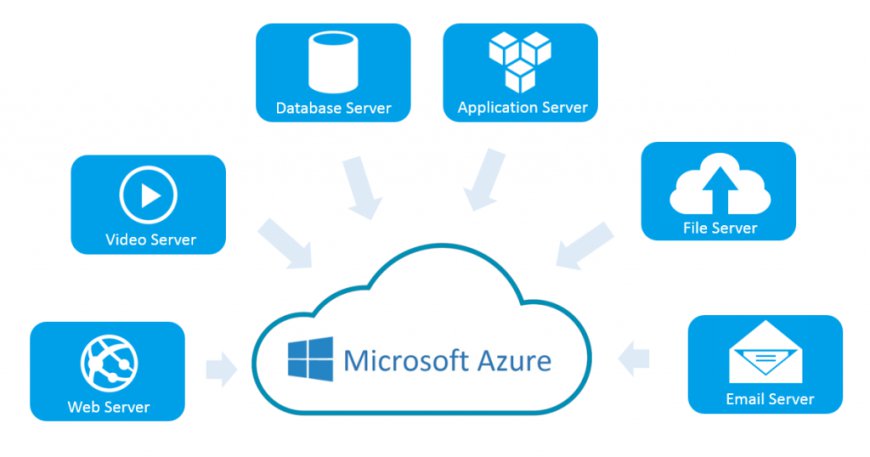Embracing the Future: A Deep Dive into Microsoft Azure Cloud Services
This blog will explore Microsoft Azure Cloud Services, including the nuances of Azure DevOps Services and its role as a leading cloud computing platform.

In the evolving landscape of technology, cloud computing has become a cornerstone for businesses striving to innovate and stay competitive. Microsoft Azure, a leader in cloud services, provides a wide range of functionalities that help organizations enhance their operations, drive efficiency, and foster innovation. This article delves into the diverse offerings of Microsoft Azure Cloud Services, with a particular focus on Azure DevOps Services and Cloud DevOps Services.
What is Microsoft Azure?
Overview of Microsoft Azure
Microsoft Azure cloud services is a comprehensive cloud computing platform that provides a variety of services, including computing power, analytics, storage, and networking. With Azure, businesses can build, deploy, and manage applications through a global network of data centers. The flexibility and scalability of Azure make it suitable for organizations of all sizes, from startups to multinational corporations.
Key Features of Microsoft Azure
- Scalability: Azure offers scalable resources to match your business demands, allowing you to easily adjust your capacity.
- Security: With built-in security features, Azure provides a secure environment for data storage and application hosting.
- Hybrid Capabilities: Azure supports hybrid cloud configurations, enabling businesses to integrate their on-premises systems with the cloud seamlessly.
- Wide Range of Services: Azure offers numerous services, including virtual machines, databases, AI and machine learning, IoT, and analytics.
Benefits of Using Microsoft Azure
- Cost Efficiency: With a pay-as-you-go model, businesses can optimize their IT budgets and only pay for the resources they use.
- Global Reach: Azure has data centers in multiple regions, allowing businesses to deploy applications closer to their customers.
- Integration with Microsoft Products: Azure seamlessly integrates with other Microsoft products like Office 365, Dynamics 365, and Power BI, enhancing productivity and collaboration.
Understanding Azure DevOps Services
Introduction to Azure DevOps
Azure DevOps Services is a suite of development tools provided by Microsoft that supports collaboration and automation in software development. It allows teams to plan, develop, test, and deliver software more efficiently and effectively.
Core Components of Azure DevOps Services
- Azure Boards: A tool for project management and tracking work items using Kanban boards.
- Azure Repos: Provides version control to manage code repositories, enabling collaboration among developers.
- Azure Pipelines: Continuous integration and continuous delivery (CI/CD) service that automates the build and deployment process.
- Azure Test Plans: A solution for testing applications and ensuring quality before release.
- Azure Artifacts: A service for hosting and sharing packages, enabling teams to manage dependencies effectively.
Advantages of Azure DevOps Services
- Improved Collaboration: Azure DevOps fosters collaboration among teams, breaking down silos and enhancing communication.
- Faster Delivery: Automation of the CI/CD pipeline accelerates the release of features and updates.
- Quality Assurance: Integrated testing tools ensure that applications are thoroughly tested, leading to higher quality releases.
The Role of Cloud DevOps Services
Understanding Cloud DevOps Services
Cloud DevOps Services encompass the practices and tools that enable organizations to streamline their software development and operations processes in the cloud. It combines the principles of DevOps with cloud computing to enhance agility and efficiency.
Key Benefits of Cloud DevOps Services
- Faster Time-to-Market: By automating deployment and leveraging cloud resources, businesses can release products and features more quickly.
- Scalability and Flexibility: Cloud DevOps services allow organizations to scale resources up or down based on demand, optimizing costs and performance.
- Enhanced Monitoring and Analytics: Integrated monitoring tools provide insights into application performance, enabling proactive issue resolution.
Best Practices for Implementing Cloud DevOps Services
- Automate Processes: Leverage automation tools to streamline repetitive tasks and reduce the risk of errors.
- Monitor and Optimize: Continuously monitor application performance and optimize resources to enhance efficiency.
- Foster a Collaborative Culture: Encourage collaboration between development and operations teams to enhance communication and teamwork.
Real-World Applications of Microsoft Azure Cloud Services
Case Studies
Case Study 1: E-Commerce Platform
A leading e-commerce platform migrated its operations to Microsoft Azure, leveraging its scalability to handle seasonal spikes in traffic. By integrating Azure DevOps Services, the development team improved collaboration, leading to faster deployment of new features. This resulted in a significant increase in customer satisfaction and sales.
Case Study 2: Healthcare Provider
A healthcare provider adopted Azure to manage patient data securely and efficiently. With Cloud DevOps Services, the organization streamlined its development processes, ensuring compliance with regulations while delivering high-quality applications. The result was improved patient care and operational efficiency.
Conclusion
Microsoft Azure Cloud Services, along with Azure DevOps Services and Cloud DevOps Services, offers a powerful platform for businesses to enhance their operations and accelerate innovation. By leveraging Azure's robust features and capabilities, organizations can achieve greater efficiency, scalability, and security.
Impressico Business Solutions can assist your organization in harnessing the full potential of Microsoft Azure. Our expertise in Azure Cloud Services and DevOps practices ensures that your transition to the cloud is smooth and efficient, enabling your business to thrive in the digital era.
